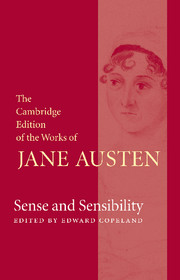Book contents
- Frontmatter
- Contents
- General Editor’s Preface
- Acknowledgements
- Chronology
- Introduction
- Note on the text
- Miscellaneous Frontmatter
- Sense and Sensibility: Volume I
- Sense and Sensibility: Volume II
- Sense and Sensibility: Volume III
- Corrections and Emendations to 1813 Text
- List of Abbreviations
- Explanatory Notes
Chapter 14
Published online by Cambridge University Press: 19 December 2020
- Frontmatter
- Contents
- General Editor’s Preface
- Acknowledgements
- Chronology
- Introduction
- Note on the text
- Miscellaneous Frontmatter
- Sense and Sensibility: Volume I
- Sense and Sensibility: Volume II
- Sense and Sensibility: Volume III
- Corrections and Emendations to 1813 Text
- List of Abbreviations
- Explanatory Notes
Summary
AFTER a proper resistance on the part of Mrs. Ferrars, just so violent and so steady as to preserve her from that reproach which she always seemed fearful of incurring, the reproach of being too amiable, Edward was admitted to her presence, and pronounced to be again her son.
Her family had of late been exceedingly fluctuating. For many years of her life she had had two sons; but the crime and annihilation of Edward a few weeks ago, had robbed her of one; the similar annihilation of Robert had left her for a fortnight without any; and now, by the resuscitation of Edward, she had one again.
In spite of his being allowed once more to live, however, he did not feel the continuance of his existence secure, till he had revealed his present engagement; for the publication of that circumstance, he feared, might give a sudden turn to his constitution, and carry him off as rapidly as before. With apprehensive caution therefore it was revealed, and he was listened to with unexpected calmness. Mrs. Ferrars at first reasonably endeavoured to dissuade him from marrying Miss Dashwood, by every argument in her power;—told him, that in Miss Morton he would have a woman of higher rank and larger fortune;—and enforced the assertion, by observing that Miss Morton was the daughter of a nobleman with thirty thousand pounds, while Miss Dashwood was only the daughter of a private gentleman, with no more than three; but when she found that, though perfectly admitting the truth of her representation, he was by no means inclined to be guided by it, she judged it wisest, from the experience of the past, to submit—and therefore, after such an ungracious delay as she owed to her own dignity, and as served to prevent every suspicion of good-will, she issued her decree of consent to the marriage of Edward and Elinor.
- Type
- Chapter
- Information
- Sense and Sensibility , pp. 423 - 431Publisher: Cambridge University PressPrint publication year: 2006

